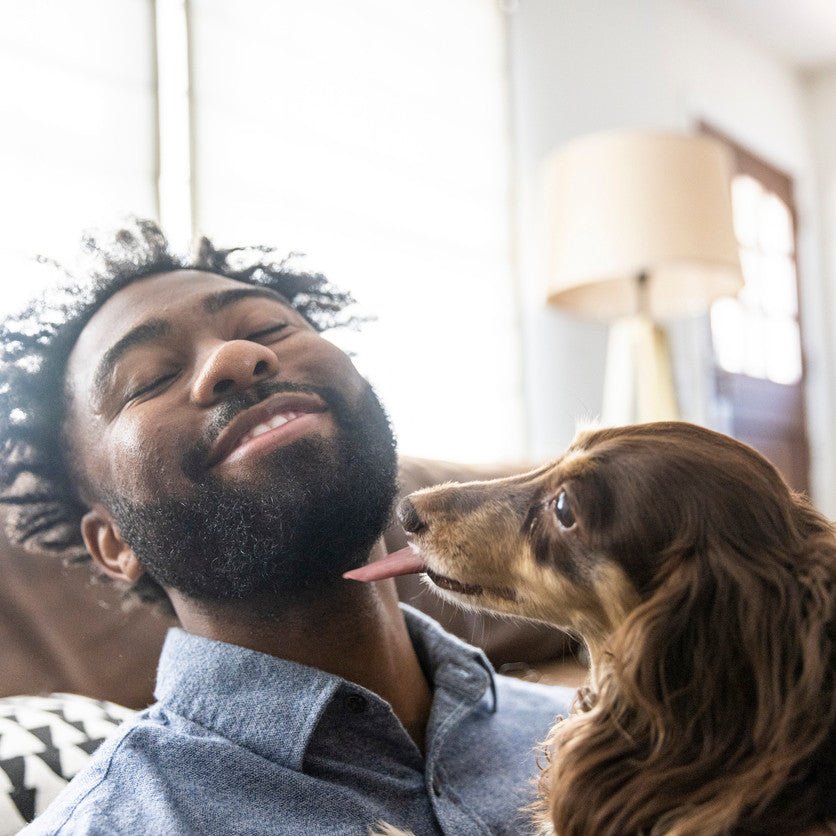Dog Science Series: The Science Behind the Human-Canine Bond

Dog owners have long known about the strong human-canine bond between them and their furry friends. For as long as there has been dog domestication, humans have felt a strong connection with their dogs. In fact, eye contact with your dog can create the same emotional feedback loop seen between a mother and her children, including introducing high levels of oxytocin.
Where does that human-canine bond come from, and why is it so intense? The human-animal bond is often strong. Humans develop strong attachments to a variety of animals, including chickens, horses, and cows. It's dogs, however, that are man's best friend—and with good reason. Several vital things can help humans bond with their dogs, which may contribute to the strong bond between them.
The Working Relationship
Historically, the dog-human bond started as a working relationship. Dogs provided humans with a variety of services, including hunting and herding. They may have served as additional guards, with strong senses that could help enhance their ability to determine whether there were any dangers around that could impact their humans. Modern domestic dogs can trace their ancestry back to prehistoric wolves, who likely provided services and companionship for humans.
That relationship, however, did not decrease when humans moved to more secure indoor areas and away from hunting and gathering. In fact, many people are more attached to their furry friends than ever.
Historically, humans domesticated dogs in at least two areas of Eurasia, according to genetic analysis of those canine partners. This suggests that humans from different regions independently concluded that these wolf-like creatures could be domesticated and that they had value as companion animals.
Modern dogs may not work the same way their historical counterparts did, but dogs still provide various services for their humans in many homes, including:
- Services offered by a certified service dog
- Connection and support provided by an emotional support animal
- Simple companionship
Socialization with Dogs
One of the most critical connections between humans and dogs is that both are pack animals. Humans need to engage in caregiving relationships with others and may feel isolated or uncomfortable when they cannot for any reason. Dogs, likewise, prefer to connect with others, and those social relationships are essential for their overall well-being. As a result, humans and dogs can engage in social symbiosis with one another. This encourages that connection and bond between them.
Both dogs and humans tend, in general, to form strong social bonds. Dogs are, in fact, highly social animals who become reliant on their humans for affection and protection. Dogs can function and be perfectly content in a relationship with humans, even when isolated from others of their own kind. That high level of socialization is important to both sides of the human-canine bond. Dogs'
Desire to Please
Dogs are eager to see their humans walk through the door, and they are inherently eager to please. For many humans, it's hard to resist that clear excitement. Dogs are incredibly social in nature, and they are frequently eager to connect with their humans. As a result, people with pet dogs may experience several health benefits due in part to that deep emotional bond and connection. In fact, many people notice a drop in heart rate and blood pressure when greeted by their furry friends, which may help enhance that bond and connection between them.
Dogs' overall sociability, and that desire to please, may help humans feel, in general, much more attached to them. Canine companions generally engage in positive social interactions with their humans, which can help the human continue to feel more positive about them over time. This may be why dogs are such an essential part of many humans' lives.
Intelligence
Intelligence plays a vital role in the dog-human bond. Dogs and humans communicate. In fact, many humans understand "dog" better than they may first think. Many humans, for example, are familiar with the signs of a friendly dog or a frightened one. Likewise, dog owners generally become very aware of their pets' signals for "play with me" or any signals their dog might be in pain.
On the reverse side, dogs often come to understand people over time. Training can teach dogs to understand specific human commands (especially with the help of delicious treats), but dogs also frequently come to understand other words that the humans around them use on a regular basis. That overall intelligence can increase humans' ability to relate to them.
Training and Adaptability
Dogs are highly adaptable and may adjust to their humans' personalities, especially if they become part of the family as puppies. Humans' interactions with their dogs can influence dogs' intelligence, responsiveness, and even personality, much the same way humans' interactions with their children can affect their growth and development over time.
No one fully understands why dogs are such an essential part of humans' lives, though there are certainly several scientific indicators that make it obvious that dogs are just as important to their humans as their humans are to them. Are you looking for ways to make your furry companion more comfortable or to enhance their life? Check out Animals Matter or contact us to learn more about our comfortable dog beds, cushy car seats, and more.
FAQs About the Human-Canine Bond
Why do humans form such a strong human-canine bond with dogs?
Oxytocin levels increase when staring into your dog's eyes, much like how human infants bond with their mothers. These love hormones may help increase the bonding between humans and their dogs.
How much do dogs love their humans?
Dogs often form a deep relationship with and attachment to their humans. The love and attachment of a dog are often pure, and dogs may continue to love their humans despite potentially difficult circumstances.
What is the difference between a dog's social cognition and human social cognition?
Dogs tend to view humans as dominant creatures. They also see humans as part of their families. In fact, dogs may rely more on humans than they do on other dogs for companionship and affection.
Subscribe
Sign up to get the latest on sales, new releases and more…
Categories
- Psyllium Husk for Dogs: Science-Based Benefits, Dosage and Use
- Dog Meal Prepping : A Complete Guide to Healthy, Time-Saving Homemade Meals
- Best Places to Take Your Dog on Vacation this 2026(USA Edition)
- Tails of Celebration: Working Dogs of the Lares Trek, A Silent Partnership In Peru
- 5 Easy Organic Christmas Recipes for Dogs: Simple Holiday Treats Your Companion Will Love
- The 6 Best Luxury Gifts for Your Dog This Christmas: Thoughtful Holiday Comfort That Truly Lasts
- Why Playtime Matters: The Benefits of Mental Stimulation and Playtime with Your Companion
- Tails of Celebration: The Miao Dog-Carrying Festival - A Hero's Honor in China
- A Dog-Friendly Thanksgiving 2025: Comfort, Calm, and Easy Treat Recipes
- The Best Dog Beds for Winter 2025: 5 Luxury Styles for Warmth, Comfort & Orthopedic Support
- Tails of Celebration: The Feast of Saint Hubert — Belgium's Timeless Blessing
- Halloween Safety Tips for Dogs: How to Keep Your Companion Safe This Spooky season
- Tails of Celebration: Día de los Muertos / Day of the Dead for Pets, A Festival of Memory in Mexico
- How to Care for Senior Dogs in Fall: Mobility Tips & Joint Support
- Tails of Celebration: Kukur Tihar & The Tihar Festival of Nepal
- What is a VDI Testing for dogs ? : Insights, Procedures and Preventive Measures
- Cheap Dog Beds vs. Luxury Dog Beds: The Real Cost of a $50 "Disposable" Dog Bed
- Can Dogs Have OCD? Understanding Canine Compulsive Behaviors (CCD)
- Does My Dog Like Music? Find Out What Tunes Make Your Pup Wag!
- Effective Solutions for Food Aggression in Dogs
- 7 Frozen Treats Your Dog Will Love This Summer☀️🧊🍉
- The Best Waterproof Liners for Dog Beds: Protect Against Spills, Drool, and Accidents
- How to Cope with the Loss of a Dog: A Tribute to Every Companion We Carry in Our Hearts
- Top Tips on How to Prevent Matting in Dogs
- Understanding and Managing Dogs with Hip Dysplasia
- The Ultimate Guide to Dog Gut Health: Natural Remedies, Probiotic Insights and Signs of Poor Gut Health
- The Best Supplements for Dogs: Explore Top Picks for Canine Health and Wellness
- How Often Should I Brush My Dog's Teeth? Tips for Optimal Canine Dental Health
- Ultimate Guide on How to Comfort Your Dog During Fireworks this 4th of July
- Managing a Blowing Coat: Essential Grooming Tips for Double-Coated Dogs.
- 5 Daily Habits That Boost Your Dog’s Long-Term Wellness
- Mastering Crate Training a Dog: Tips and Benefits
- Dog Car Seats vs. Seat Covers: What’s The Best Option For Your Companion?
- Best Outdoor Dog Beds: Luxury, Durability, and Unmatched Comfort
- Is My Dog Overweight? Tips to Assess and Help Your Companion
- The Best Faux Fur Dog Beds for Ultimate Pet Comfort of 2025
- Dog Running Guide: How to Start, Train & Stay Safe when running with your Dog
- Indestructible Dog Beds? The Truth Behind the Term
- Top Tips for Effective Exercise for Dogs
- Effective Dog Ear Cleaning: A Step-by-Step Guide for Maintaining Healthy Ears
- How to Manage Dog Aggressive Behaviors: Expert Tips and Advice
- Effective Canine Ear Infection Remedies: Symptoms, Causes & Treatments
- How to Make a New Dog Comfortable in Their New Home - 2025 Guide
- Signs of Dog Allergy Symptoms and How to Help and Prevent Them
- Why Does My Dog Lick Their Paws? Causes and Solutions Explained
- Dog Alzheimer's: Symptoms, Causes, and Treatment Options
- The Legacy of Comfort with the Iconic Animals Matter® Ortho Companion-Pedic® Puff Luxury Dog Bed
- Orthopedic Square Dog Beds: The Ultimate Blend of Luxury, Comfort, and Support
- Loungers: The Ultimate Beds for Luxury, Comfort, and Orthopedic Support
- Square Dog Beds: Orthopedic Comfort and Stylish Designs for Your Companion


Leave a comment
Please note, comments must be approved before they are published